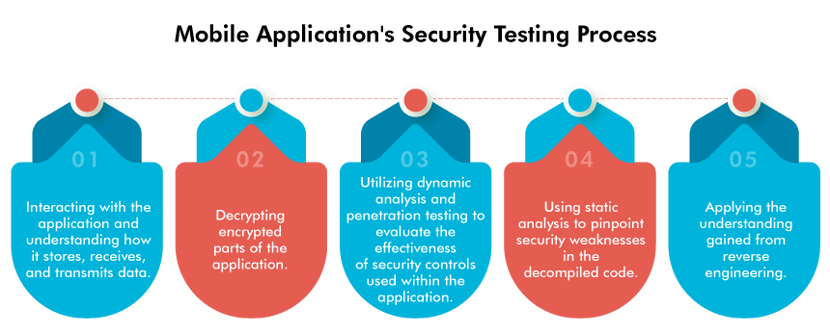
With advanced testing techniques powered by Artificial Intelligence (AI), one can significantly improve mobile app security. However, many organizations struggle with mobile app security's complexity and evolving nature. This challenge often results in vulnerabilities that can be exploited, leading to data breaches and a loss of user trust. Advanced testing techniques powered by Artificial Intelligence (AI) solve these security concerns.
AI-driven testing helps us proactively detect vulnerabilities, identify potential threats, and reduce security risks more effectively. This approach not only strengthens mobile app resilience but also builds user trust in our interconnected digital world. This blog explores key security testing methods and the concept of reverse engineering, highlighting their vital role in identifying and mitigating vulnerabilities in the evolving mobile app ecosystem.
What is Mobile App Security Testing?
Security testing of mobile apps involves thoroughly examining potential vulnerabilities that malicious users could exploit. Effective security testing begins with understanding the application's architecture and the types of data it handles. The process starts with understanding the application's architecture and the types of data it handles, which helps pinpoint areas susceptible to attacks.
Key methodologies used in this testing include:
- Static application security testing (SAST) analyzes the application's source code to detect vulnerabilities early in the development lifecycle.
- Dynamic application security testing (DAST) evaluates the application's running state to uncover issues during execution. It also performs penetration testing, simulating real-world attacks to identify known and unknown vulnerabilities.

Understanding Security Testing for Mobile Apps: Android vs iOS
Security concerns remain consistent across Android and iOS devices, yet the unique development and distribution methods of apps on each platform result in distinct security issues.
Security Issues in Android |
Security Issues in iOS |
|---|---|
|
Android devices, with their open-source nature, provide a versatile platform for innovation and customization. The flexibility and freedom offered by the Android platform empower users and developers alike to create unique and personalized experiences. Along with these benefits, an ongoing commitment is to enhance security measures and address vulnerabilities to ensure a safe and reliable ecosystem for all users. |
Apple's closed development operating system creates a robust security environment that significantly reduces the likelihood of unauthorized access and system vulnerabilities. While iOS devices benefit from this stringent security model, it's essential to acknowledge that no system is entirely immune to cyber threats. By recognizing potential security concerns and implementing proactive measures, we can enjoy a safe and protected experience. |
The standard security issues in Android apps include:
|
The standard security issues in iOS apps include:
|
AI-augmented Automated Mobile App Security Testing
AI offers a range of capabilities that significantly enhance the effectiveness and efficiency of security testing of mobile apps. Here are the key advantages of incorporating AI in the mobile security testing domain:
-
Advanced Security Testing Scripts
Developed in our security testing lab, these AI-enhanced scripts thoroughly test mobile apps for vulnerabilities, leveraging machine learning to adapt and improve over time.
-
Biometric Authentication Testing
AI-generated deepfakes (images and videos) are used to evaluate the robustness of biometric authentication systems, ensuring they can withstand sophisticated spoofing attempts.
-
Predictive Analytics
AI uses predictive analytics to anticipate potential security threats by analyzing current trends and historical data, enabling proactive mitigation strategies.
-
AI-powered Risk Assessment
AI tools assess overall security risks by analyzing factors such as application architecture, code quality, and external dependencies, providing a comprehensive risk profile of the mobile application.
-
Behavior Analysis
AI algorithms monitor and analyze mobile app behavior to detect suspicious activities or deviations from standard patterns, helping to identify potential security threats.
-
Dynamic Test Case Generation
Based on app behavior analysis, AI generates dynamic test cases, ensuring comprehensive coverage and efficient security testing.
-
Continuous Learning and Adaptation
AI systems continually learn from new data and adapt to emerging threats, autonomously evolving to incorporate the latest threat intelligence, enhancing their capabilities over time.
Benefits Derived from Mobile App Security Assurance
Ensuring robust security for mobile applications protects sensitive data and brings many benefits that enhance the overall user experience and trust. Here are a few of them:
- Enhanced Protection Against Cyber Threats: By conducting mobile application security testing, vulnerabilities that hackers could exploit are identified and addressed in advance.
- Maintenance of Customer Trust: Effective security testing helps to maintain customer trust. Customers who trust an app are more likely to continue using it, resulting in increased loyalty and retention rates.
- Mitigation of Financial Risks: By proactively identifying and addressing security vulnerabilities, the financial impact of potential data breaches is minimized. Investing in security testing reduces the cost of repairing damages caused by security breaches.
- Reduce Reputational Damage: Security breaches tarnish businesses' reputations, resulting in lost trust among customers and stakeholders and affecting brand image and market perception.
- Decreased Competitiveness: Businesses that do not prioritize mobile app security testing compromise their competitive edge in the market. Consumers increasingly prioritize security and data privacy when choosing apps, favoring those with robust security measures over insecure alternatives.
Role Of QASource
At QASource, we offer a team of skilled security testing experts proficient in identifying vulnerabilities in mobile apps. As a leading software testing company, we specialize in mobile app security testing, including static analysis, dynamic analysis, and penetration testing, all enhanced by AI technologies. Every business has unique security needs, so we provide customized solutions tailored to your requirements. By partnering with us, you can add value to your company and confidently ensure the security of your mobile applications.

Conclusion
Mobile app security is crucial for protecting user data, building trust, and meeting legal standards. By leveraging AI capabilities alongside thorough security testing methods, utilizing essential mobile app security testing tools, following best practices, and learning from real-world cases, we can enhance the security of mobile apps. Maintaining app security is vital to staying compliant with regulations and addressing challenges.
Have Suggestions?
We would love to hear your feedback, questions, comments, and suggestions. This will help us to be better and more useful next time.
Share your thoughts and ideas at knowledgecenter@qasource.com


